
Stories from our School
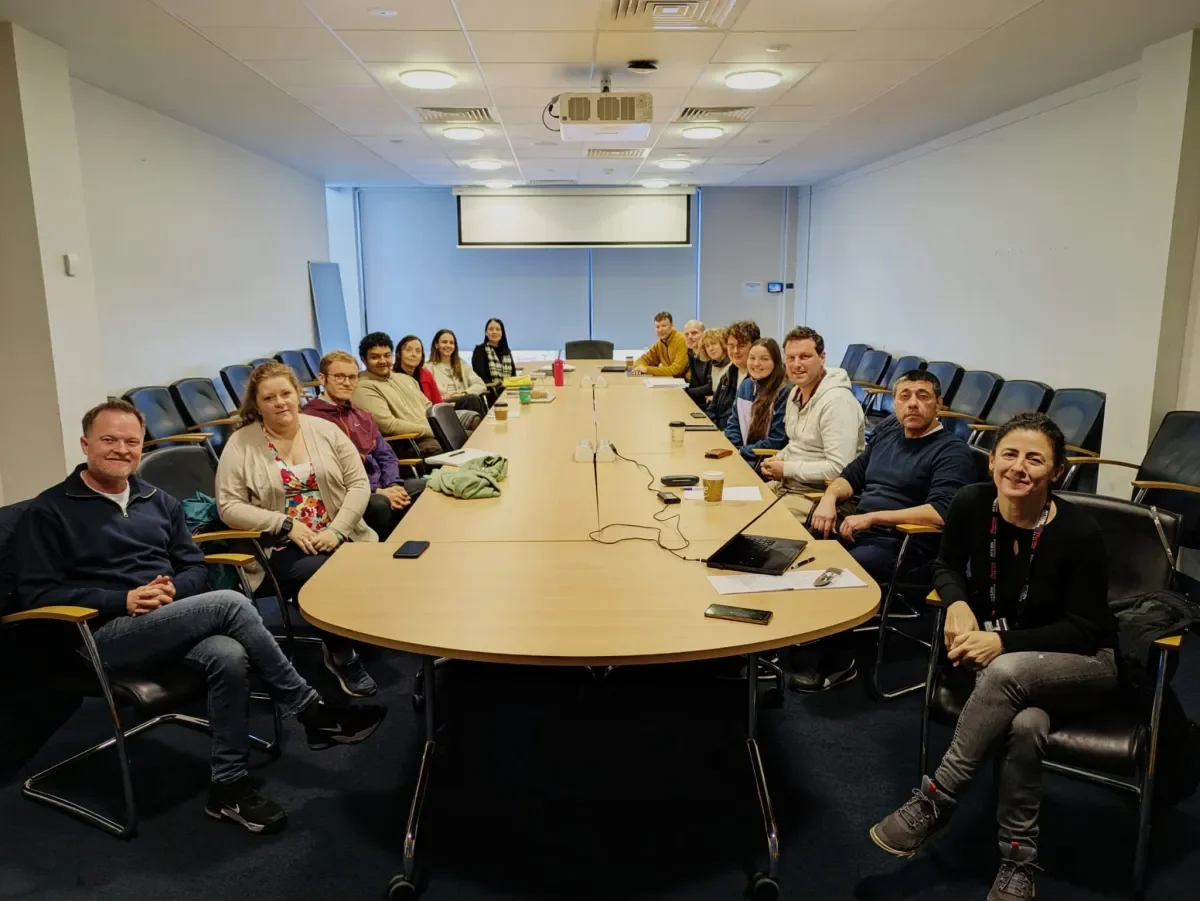
The School of Chemical Sciences secures the Athena SWAN Bronze Award
In July 2025, the School of Chemical Sciences was honoured with a Bronze Athena SWAN Award, reflecting its commitment to advancing gender equality in science and academia. Athena SWAN (Scientific Women’s Academic Network) recognises institutions that take concrete, data-driven action to promote diversity, inclusion and gender equity
Holding the Bronze award signifies the School’s successful self-assessment, evaluation of gender representation, and implementation of a four‑year action plan aimed at addressing discrepancies in recruitment, promotion and workplace culture. It marks the School’s dedication to increasing female representation in leadership, supporting staff at all career stages, and creating a more inclusive environment for researchers and students alike.
Beyond symbolic recognition, the award has practical impacts. The School will now work to develop tailored policies on flexible working, unconscious bias training, and family-friendly practices. Regular data review fosters transparency and accountability. Athena SWAN Bronze serves as the foundation for more our ambitious goals, including Silver and higher-level awards.
The Bronze Athena SWAN Award thus signals a clear commitment: the School is not only aware of gender-related challenges but is actively working to dismantle barriers. It promises a fairer, more supportive academic culture.
DCU School of Chemical Sciences Leads rePAINT Project to Tackle Ireland’s Waste Paint Problem
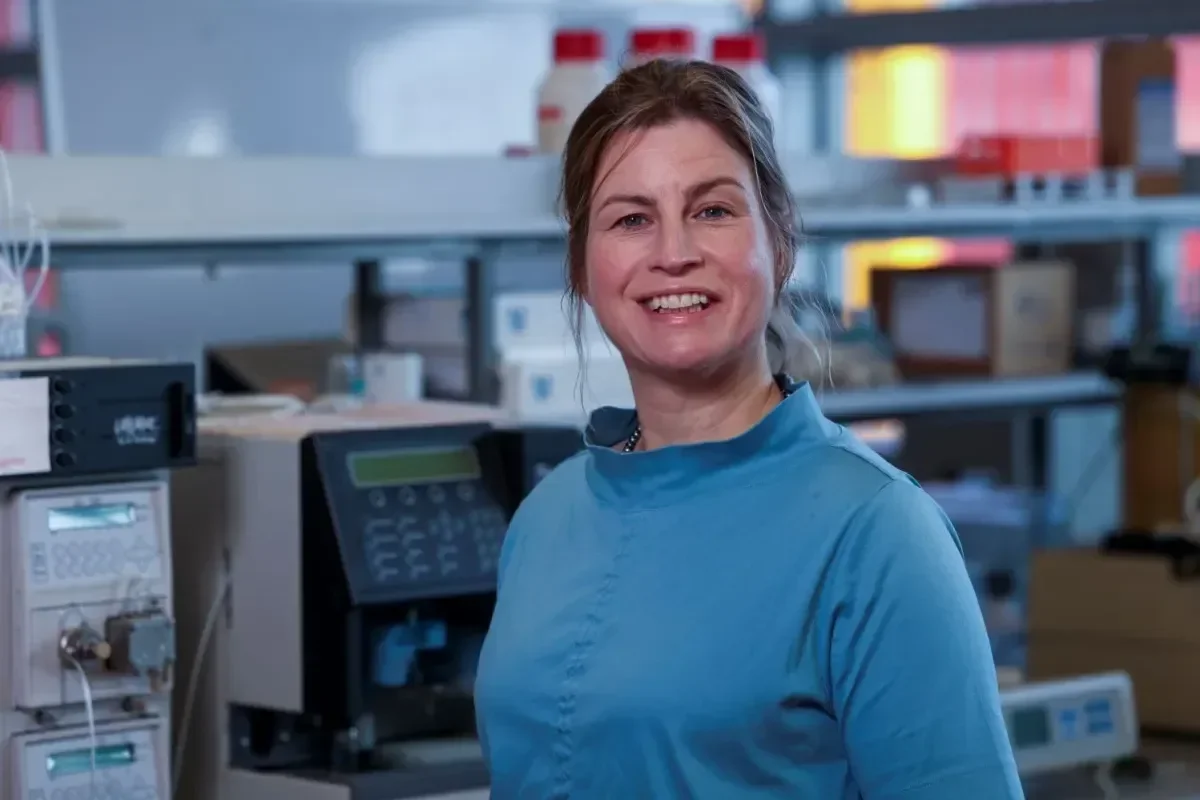
Dr Aoife Morrin
Dr Aoife Morrin has secured funding from the Environmental Protection Agency for the rePAINT project, a new initiative aimed at addressing Ireland’s growing waste paint challenge. Currently, around 3,500 tonnes of paint-related waste are exported for incineration each year. The rePAINT project seeks to divert this material from the waste stream by enabling safe, scalable reuse of leftover paint. The project will develop analytical methods and scientific processes to support this goal, focusing on quality assessment, microbial screening, decontamination, and polymer recovery. This collaborative programme brings together DCU, the Rediscovery Centre, several civic amenity sites, and SME partner Allergy Standards, demonstrating how chemistry research can deliver practical solutions with real-world environmental impact.
Dr Morrin has said "We estimate that the average household in Ireland has at least 6 tins of leftover paint in their garages and sheds which is of value to the Circular Economy of paint. We are excited to work with social enterprise, county councils and private industry to come up with new rePAINT solutions that can effectively leverage this resource into paint recycling initiatives."
Professor Fiona Regan Awarded €1.5M for Groundbreaking Marine Biodiversity Project "MariBiome"
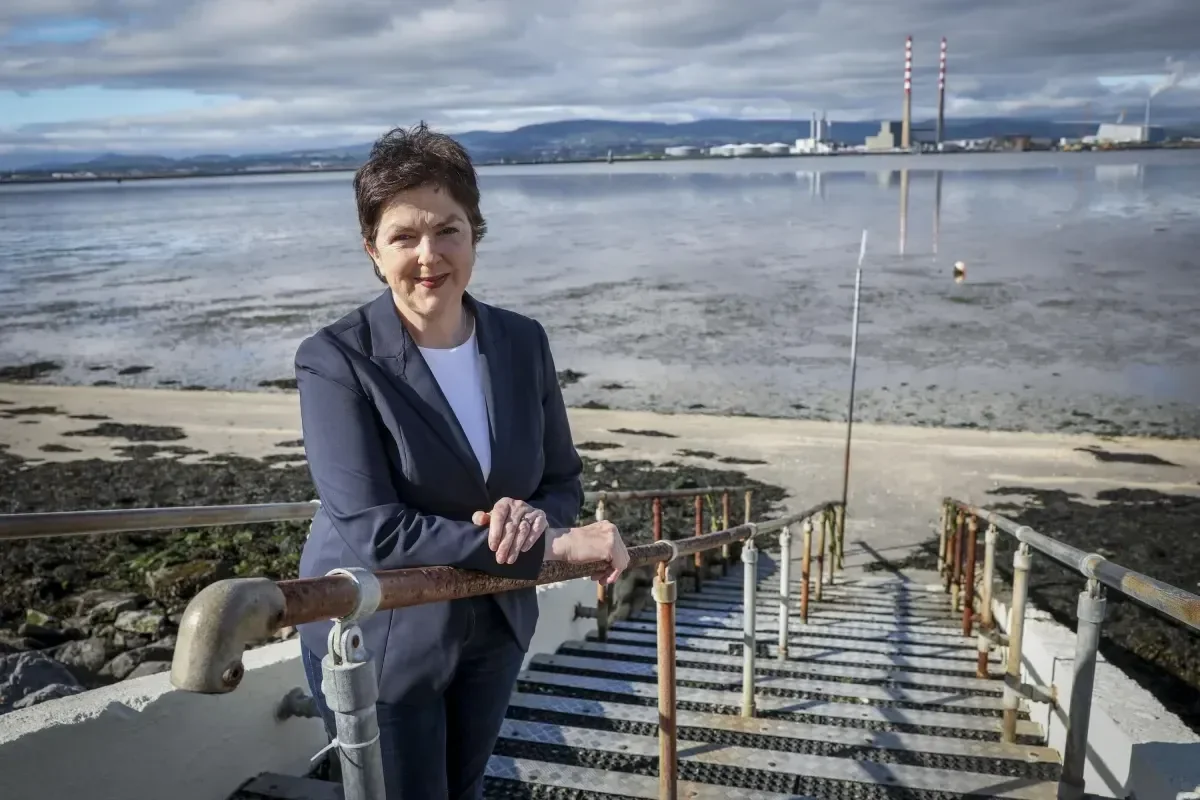
Prof. Fiona Regan
Professor Fiona Regan, Director of the DCU Water Institute and staff member in the School, will lead the groundbreaking MariBiome project, a €1.5 million Marine Institute-funded initiative launched in July 2025. This five‑year project aims to revolutionise marine ecosystem monitoring across Ireland through state‑of‑the‑art eDNA sensing tools, rapid testing methods, autonomous sensor platforms, and robust biodiversity data integration. Under her guidance, MariBiome will also support the training of five new PhD students in marine genomics, environmental modelling, and sensor technology, ensuring a talented next generation of marine scientists.
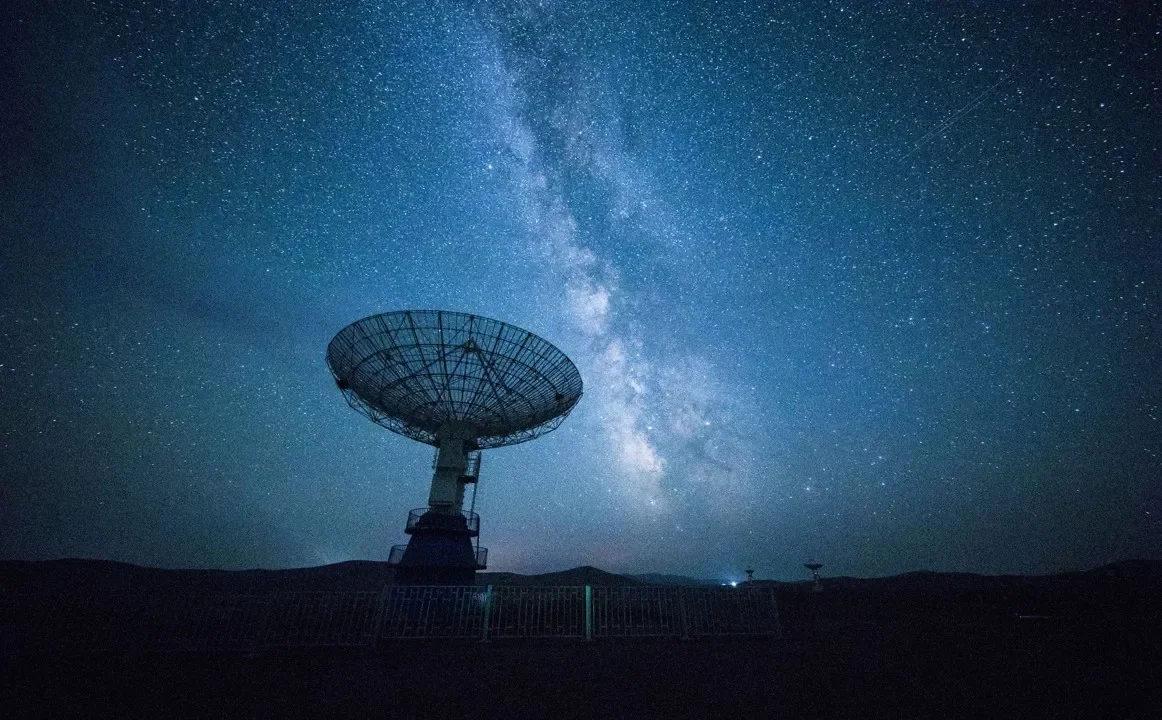
Dr Seán Jordan talks space on Futureproof
In May 2025, Dr Seán Jordan from DCU School of Chemical Sciences appeared as one of three expert guests on Newstalk’s Futureproof podcast for a special episode titled Is There Anybody Out There? The episode explored the age-old question of whether humanity is alone in the universe, and what scientific efforts are currently underway to find out.
Dr Jordan, a researcher in astrobiology and planetary science, discussed the growing search for life beyond Earth, from microbial life on Mars to intelligent civilisations on planets orbiting distant stars. He explained how modern telescopes and space missions are now capable of detecting biosignatures (evidence of life) and technosignatures (evidence of technology) from light years away. These advances mean that the ideas behind the famous Drake Equation, proposed in 1961 to estimate the likelihood of extraterrestrial life, are finally being tested with real data.
Alongside fellow guests, Dr Jordan helped break down complex scientific ideas into accessible insights, sparking curiosity and wonder in listeners of all ages. The conversation touched on alien communication, the challenges of interstellar contact, and what it would mean for humanity if we ever do find out that we’re not alone.
You can listen here: https://www.newstalk.com/podcasts/futureproof-with-jonathan-mccrea/documentary-special-is-there-anybody-out-there
Recent conference presentations

Staff and students from the School of Chemical Sciences present at conferences throughout the year.
Recently, final year postgraduate student, Rhianne Curley working under the supervision of Prof. Tia Keyes, was awarded the Irish Biological Inorganic Chemistry Society (IBICS) Postgraduate Gold Medal Award 2024. Rhianne gave her award seminar and received the medal from Prof Luca Ronconi at the 8th IBICS Symposium in University College Cork in December 2024 (Left).
Postdoctoral researchers Dr Indherjith Sakthinathan and Dr Áine Brady from the Forster Research Group presented their most recent findings on their respective projects at the Research Ireland Centre, FutureNeuro, research day (Centre).
Prof. Silvia Giordani headed to Paris at Christmas time to present at SNAIA-CRISTMAS 2024 Conference on Research and Innovations in Science and Technology of Materials at the École Nationale Supérieure de Chimie de Paris. She gave a fascinating plenary talk titled "Tailoring Carbon Nanoparticles for drug delivery" (Right).
International Mens Day - Technical Team Hero
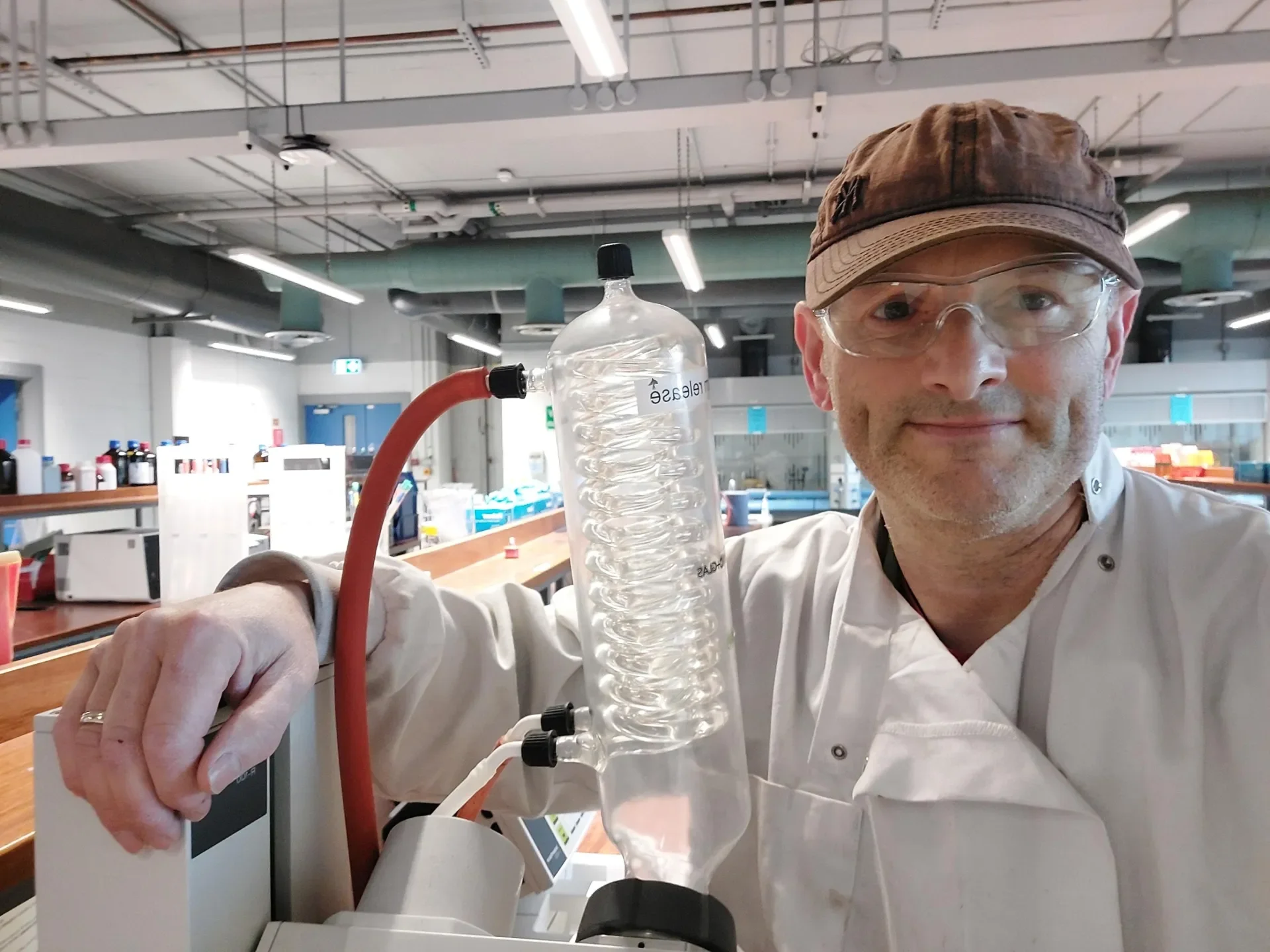
Damien McGuirk
Many people in DCU may be familiar with our Senior Technical Officer, Damien McGuirk, but do they know all that he has contributed to the School? This International Mens Day, we wanted to highlight all that Damien has done for the School over his considerable career.
Damien's contribution to the School is simply immense, with over 33 years of first-hand experience in the development and running of undergraduate teaching labs. He even holds the title of the longest serving male technical officer with the School! Heads of School have come and gone, new hires arrived fresh out the gate, staff retirements (exiting through the gate), new lab developments and curriculum changes, Damien has been there throughout it all.
From his early years in developing the Chemistry and Pharmaceutical (formerly Pure and Applied Chemistry) degree programme from a practical perspective, to his extensive work and dedication in formulating the School's first official safety policies, his professional support and advisory skills are second to none. With a background in pharma, Damien brings a particular skillset to the role of Technical Officer within the school and is always accommodating and generous with his knowledge and expertise.
Dr Michał Bartkowski wins the Outstanding Graduate Researcher Award
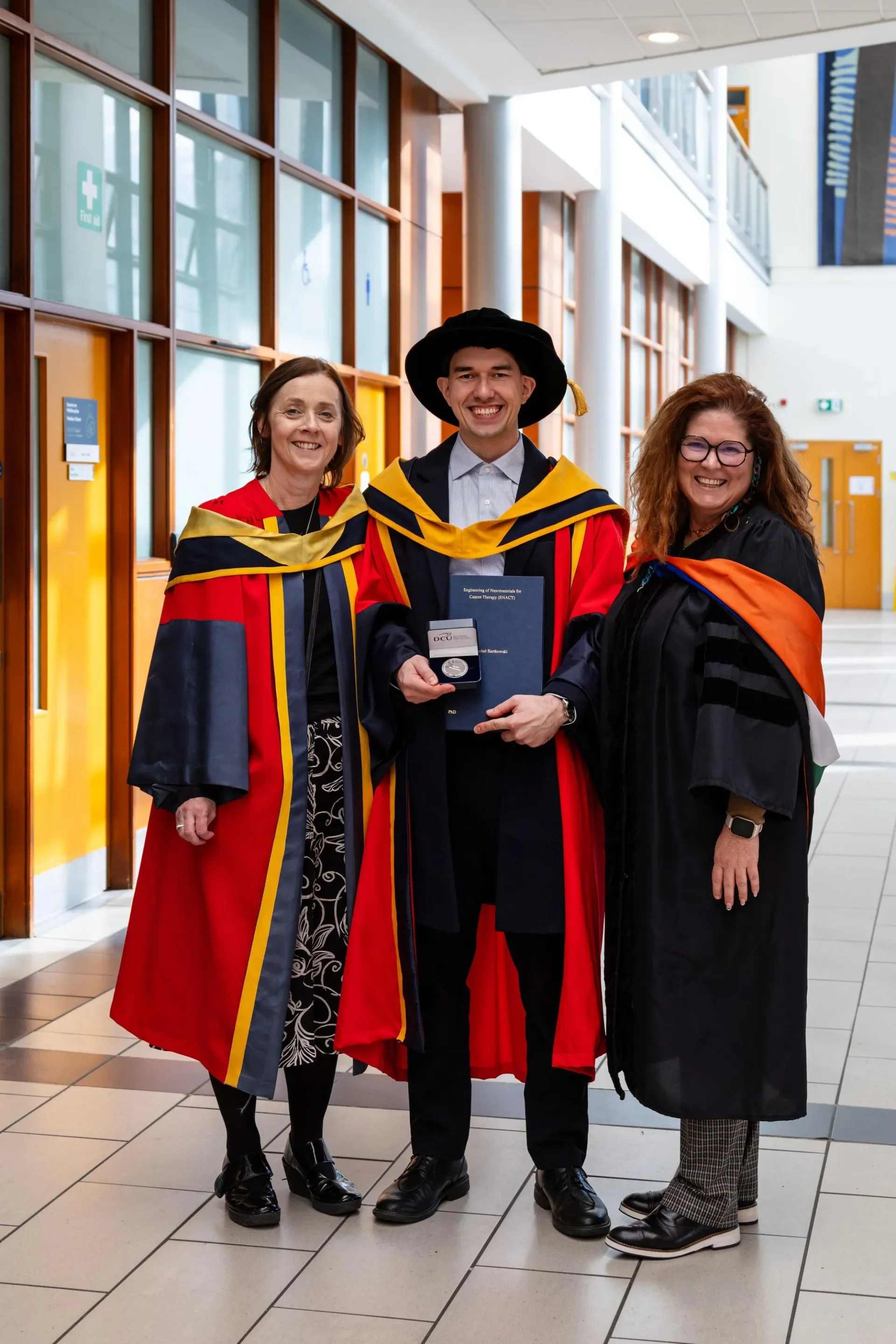
Prof. Mary Pryce, Dr Michał Bartkowski, and Prof. Silvia Giordani
Congratulations to Dr. Michał Bartkowski from the School of Chemical Sciences, who was awarded the prestigious DCU Faculty of Science and Health Outstanding Graduate Researcher Award on the day of their PhD graduation. This award recognises outstanding graduate students who have made substantial contributions to research within the Faculty of Science and Health at DCU.
Dr Bartkowski's PhD was completed under the supervision of Prof. Silvia Giordani and was entitled "‘Engineering of Nanomaterials for Cancer Therapy". More information on his work and the work of the Giordani group can be found here.
Dr Aoife Morrin part of the team that wins prestigious DELTA teaching prize
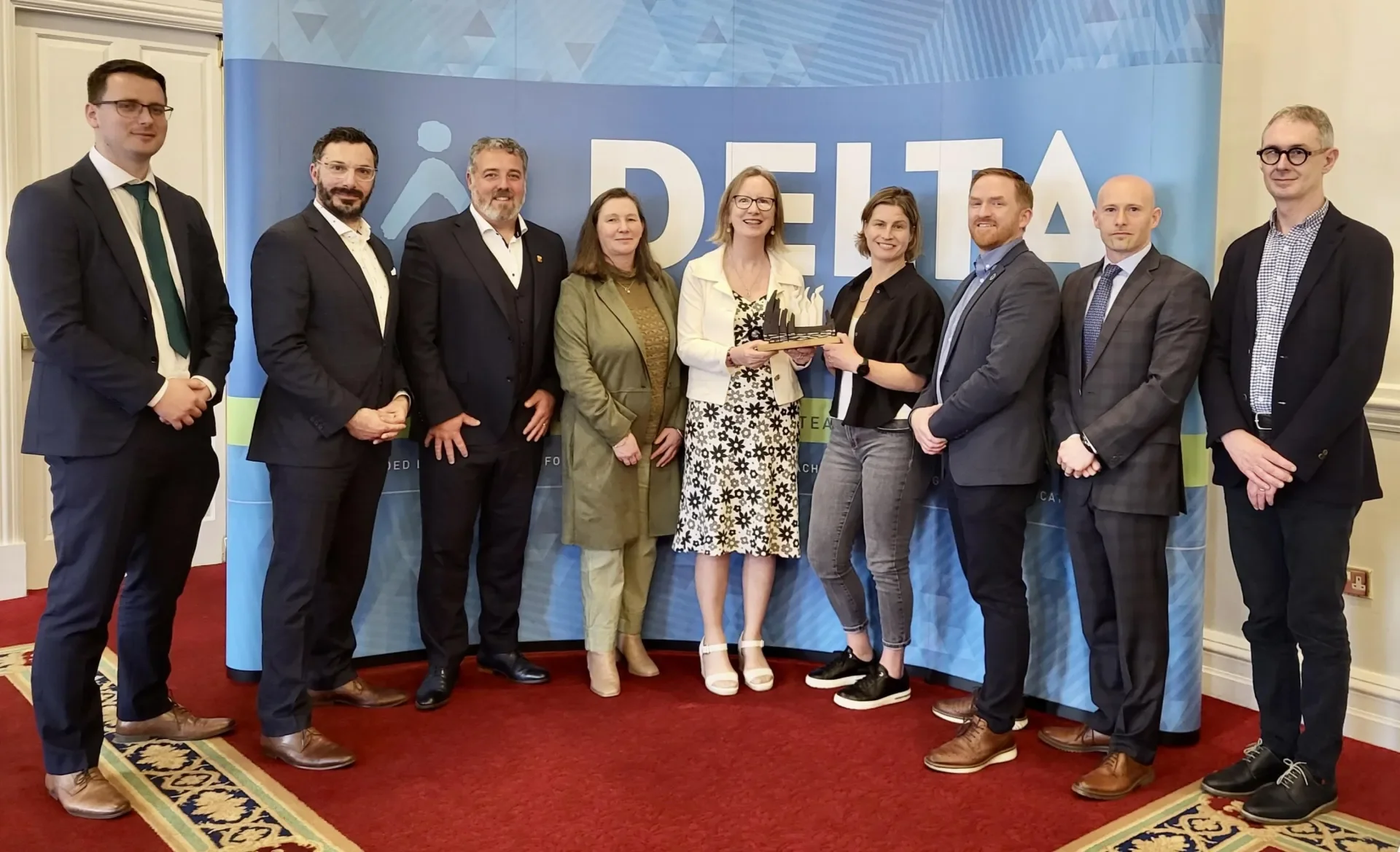
The Virtual Lab Team
Dr Aoife Morrin is part of the Virtual Lab HCI P3 Initiative team which won a prestigious teaching award;. The DELTA (Disciplinary Excellence in Learning, Teaching and Assessment) Awards celebrates outstanding achievements in teaching, learning, and assessment by teams from higher education institutions across Ireland.
The Virtual Labs HCI P3 Initiative, a multi-institutional collaborative effort led by Maynooth University with Technological University of the Shannon, Dublin City University, Dundalk Institute of Technology and University College Cork was introduced by Professor Tim Thompson, Vice President of Students and Learning, Maynooth University with team lead Professor Denise Rooney, Head of Department of Chemistry.
Professor Marie Clarke, Chair of the Higher Education Authority Student Engagement Teaching and Learning Committee, highlighted the significant impact of the award-winning team, stating, “The strength of this year’s cohort lies in its diversity. Each award-winning team has developed a unique and impactful commitment to the enhancement of their discipline, greatly enriching the learning experience and directly contributing to student success. They also serve as a valuable resource for other institutions, setting a strong example in promoting best practices.”
Congratulations to Dr Morrin the team!
Prof. Giordani successful in securing over €1 million for nanotechnology research
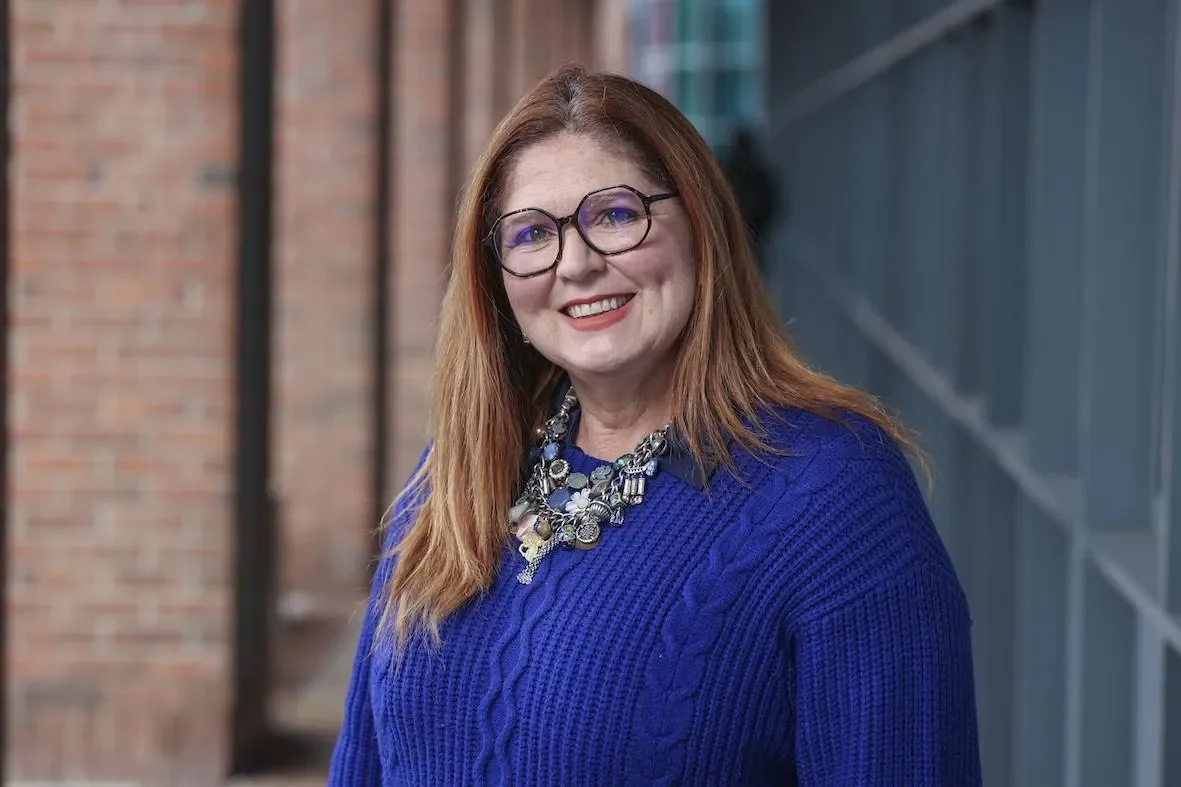
Prof. Silvia Giordani
Prof. Giordani has been awarded a research grant worth over €1 million from Science Foundation Ireland. The Frontiers for the Future Award will support world-leading research in Prof. Giordani's lab in the School of Chemical Sciences. “Our research is at the forefront of nanomedicine, focusing on developing innovative drug delivery systems using carbon nano-onions,” said Prof Giordani. “This technology aims to revolutionise the treatment of cancer by providing targeted, efficient and low-dose therapies with minimal side effects. By improving the precision of drug delivery, our work has the potential to significantly enhance the quality of life for patients, reduce treatment costs, and increase the effectiveness of current medical interventions. I am grateful for the support from SFI and the confidence they have placed in our work. This grant will allow us to collaborate with leading experts, acquire cutting-edge technology, and accelerate our research.”
Prof. Keyes awarded the Institute of Chemistry of Ireland Boyle Higgins Gold Medal 2024
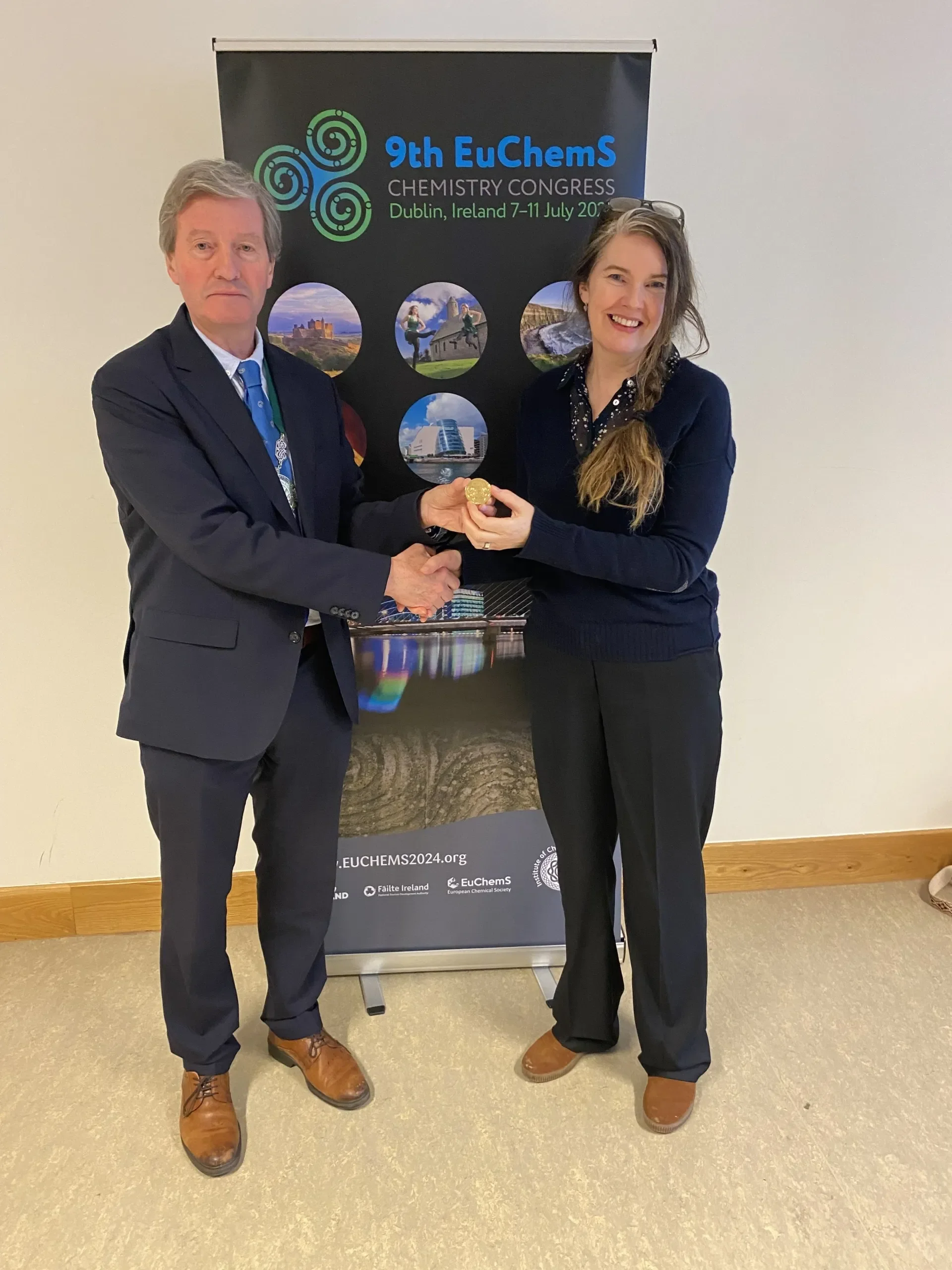
Prof. Patrick Guiry and Prof. Tia Keyes
In April 2024, DCU School of Chemistry professor, Prof. Tia Keyes, was awarded the Boyle Higgins Gold Medal by the Institute of Chemistry in Ireland, in recognition of her outstanding contribution to chemistry. The award is given annually to outstanding and internationally recognised Irish research contribution to the advancement of chemistry by a chemist of any nationality working in Ireland or by an Irish chemist working overseas.
Prof. Keyes runs a research group which encompass supramolecular and interfacial chemistry, biophysics and photonics, and her team are members of DCU Water Institute and SFI Funded Centre IPIC; The Irish Photonics Integration Centre.
The medal was inaugurated in 1985 to encourage the advancement of chemistry in Ireland. It recognises research work carried out in chemistry under the headings: pure chemistry; applied and industrial chemistry; and chemical education. Known as 'The Boyle Higgins Medal and Lecture of the Institute of Chemistry of Ireland' the award involves a gold medal and a monetary sum to cover expenses for a lecture.
Prof. Keyes received her award from Prof. Patrick Guiry, president of the Institute of Chemistry in Ireland.
Prof. Kellett wins the 2023 President's Award for Research
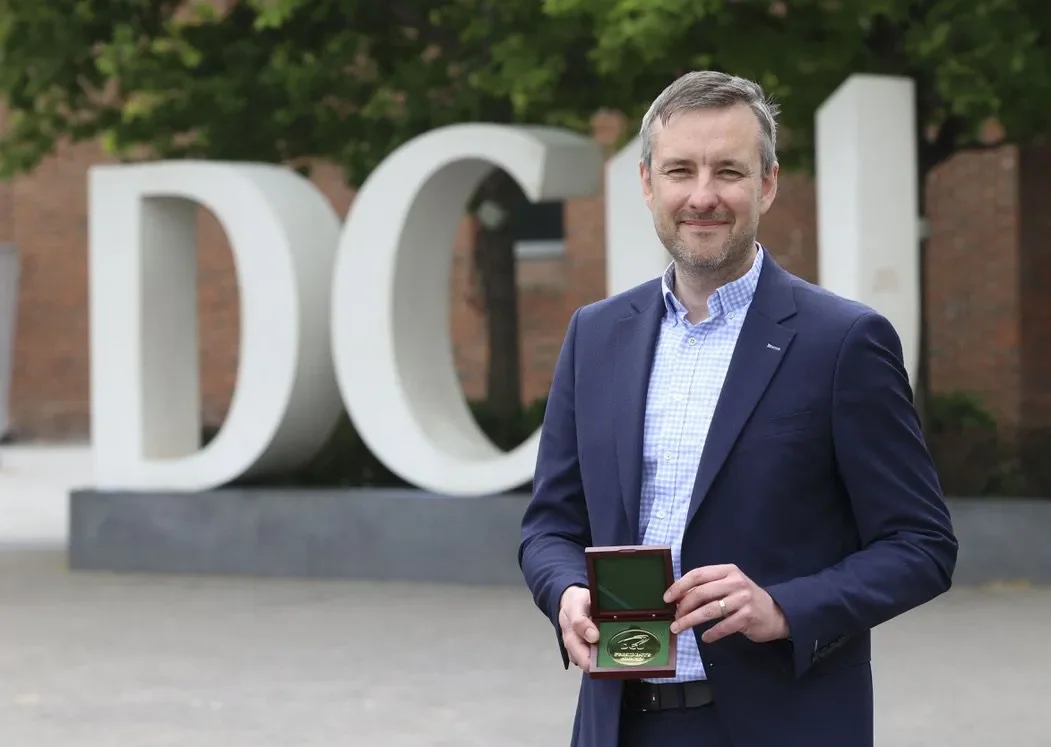
Prof. Andrew Kellett
Prof. Andrew Kellett was awarded the 2023 DCU President’s Research Medal within the field of “Natural Sciences, Health, Engineering and related areas”. Prof. Kellett led multiple research projects spanning chemical sciences and chemical biology.
Prof. Kellett is the co-ordinator of the NATURE-ETN Project which seeks to extend the boundaries of molecular medicine and provide new tools for treating cancer and monogenetic diseases. The network includes ten beneficiaries and seven partner organisations, including nine leading research institutions, five cutting-edge SMEs and three multinationals.
Andrew’s work has also been recognised externally with prestigious prizes from Enterprise Ireland and the Science Foundation Ireland Research Centre for Pharmaceuticals.
Recent funding successes for researchers in the school
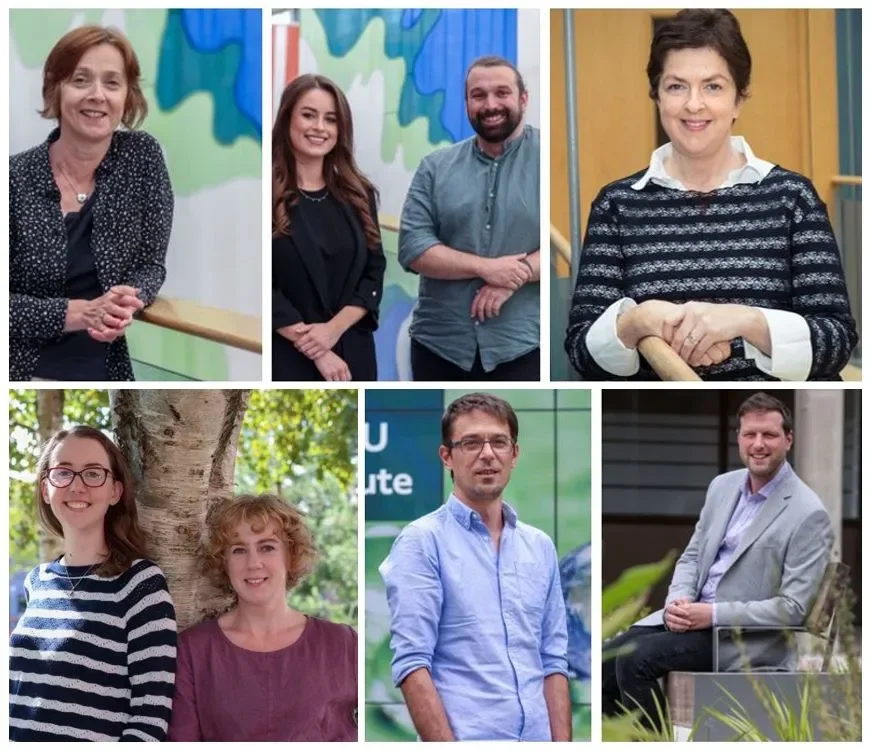
Top row, left to right: Prof. Mary Pryce, Dr Eadaoin Carthy (DCU Mechanical Engineeering), Dr Ruairí Brannigan, Prof. Fiona Regan
Bottom row, left to right: Dr Jennifer Gaughran (DCU Physics), Dr Susan Kelleher, Dr Ciprian Briciu-Burgina, Dr David O Connor
Congratulations to a number of DCU Chemical Sciences researchers who have secured funding totaling €2 million from the Science Foundation National Challenge Fund. These awards will fund research in some of the most challenging and important areas of science, including in the extraction of harmful forever chemicals from the environment to tackling the issue around antimicrobial resistance.
The researchers will now compete to secure further funds in the next round of the call, and each ultimately has the chance to secure the overall Prize Award of €2 million for their project. More information on the research can be found below.
| SCS Researcher(s) | Project Title | Link |
| Prof. Mary Pryce | NoHoW-AMR: New One Health One Water technologies to reduce antimicrobial resistance threats by enhanced water disinfection | Link |
| Dr David O Connor | AGSENSE: Agricultural Fungal Sensing | Link |
| Dr Ruairí Brannigan | LEAFLOCK - Sticky Solutions: The Development and Implementation Sustainable Biostimulant Adhesives for Enhanced Fungicide Delivery to Safeguard Crops | Link |
| Prof. Mary Pryce | H2Glas: Developing more sustainable approaches to green hydrogen production to aid Ireland’s energy transition approaching 2050 | Link |
| Dr Susan Kelleher | PUreTex: Creating Polyurethane Insulation from Recycled Textiles | Link |
| Dr Ciprian Briciu-Burgina and Prof. Fiona Regan | RESTART: Provision of microbiological water quality data in a time-frame that enables rapid decision-making and risk mitigation | Link |
| Dr David O Connor | BOHEMIAN: Biological and chemical aerosol monitoring and modelling | Link |
| Dr Ruairí Brannigan | PolyFASt: Revolutionizing Water Purification: An Innovative Filtration-based Approach for the Effective Elimination of Per- and Polyfluoroalkyl Substances (PFAS) | Link |
The School of Chemical Sciences has two new Professors!
Dr Mary Pryce and Dr Andrew Kellett were recently both promoted to Professor. This is a considerable and much deserved achievement for both.
Prof. Pryce runs a research group in the area of advanced materials for green energy production and antimicrobial applications. More information can be found here.
Prof. Kellett runs a research group in the area of inorganic medicinal chemistry which focuses on anti-cancer therapies. More information can be found here.
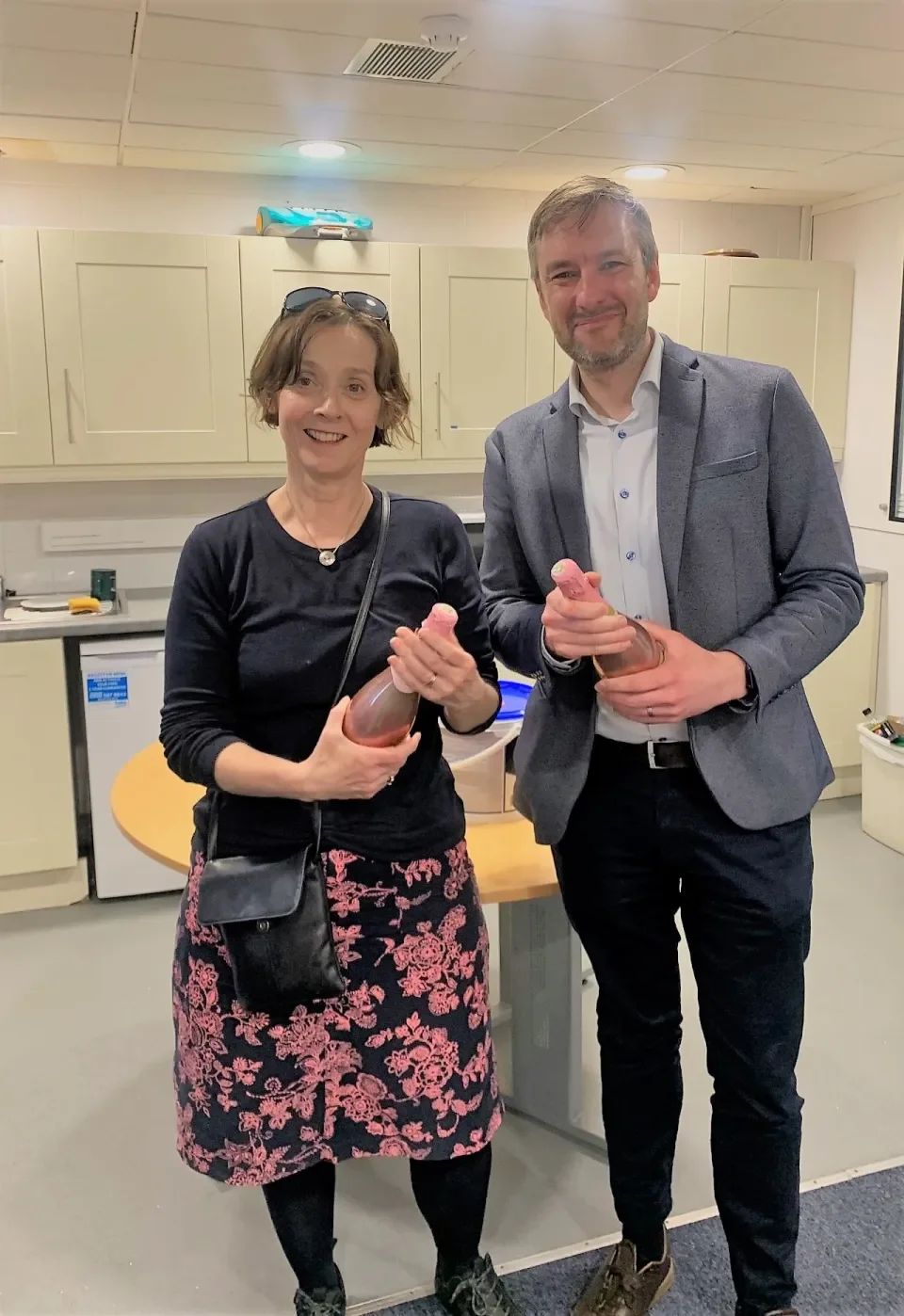
Prof. Mary Pryce and Prof. Andrew Kellett
SFI Funding success in for Prof. Robert Forster and Dr Kieran Nolan

Prof. Robert Forster (left) and Dr Kieran Nolan (right)
Congratulations to Dr Kieran Nolan who has received funding worth €1.039m from the SFI Frontiers Programme for research into producing more temperature stable enzymes, and cheaper, safer, more sustainable drugs and bio-medicines. Congrats also to Prof Robert Forster who has received funding worth €604,000 from the SFI Frontiers Programme for research aimed at harnessing the power of electricity in ‘electroceuticals’ to better treat diseases.
Hay fever treatment ‘revolutionised’ by new laser technology that allows real-time pollen measurement
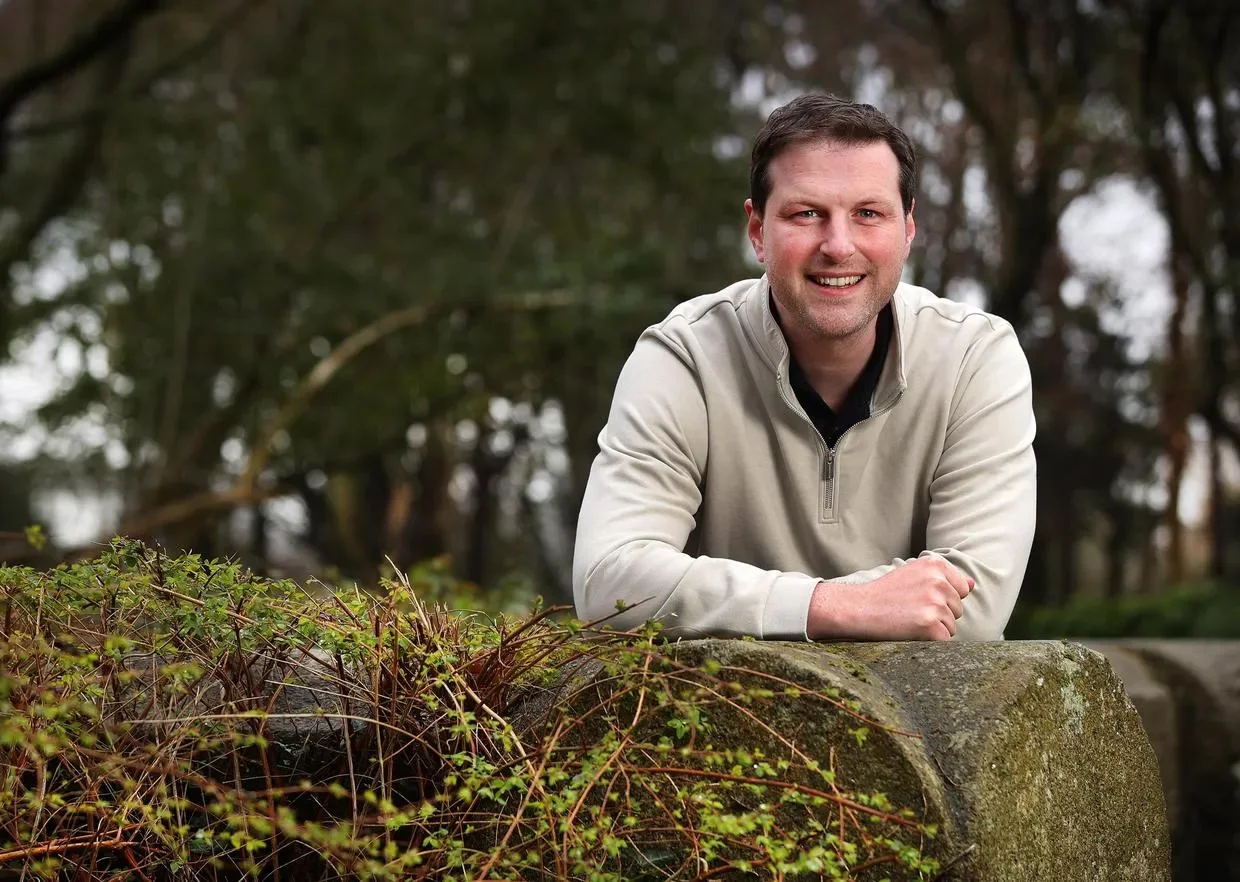
Dr David O Connor.
A new independent pollen forecast - created by researchers including Dr David O'Connor from the School of Chemical Sciences - allows sufferers to be more targeted in managing their conditions and take antihistamines the night before.
Read: https://launch.dcu.ie/3lB0Bw3 and Listen: https://www.rte.ie/radio/radio1/clips/22229251/
DCU researchers working on understanding how Bull Island acts as a natural carbon sink
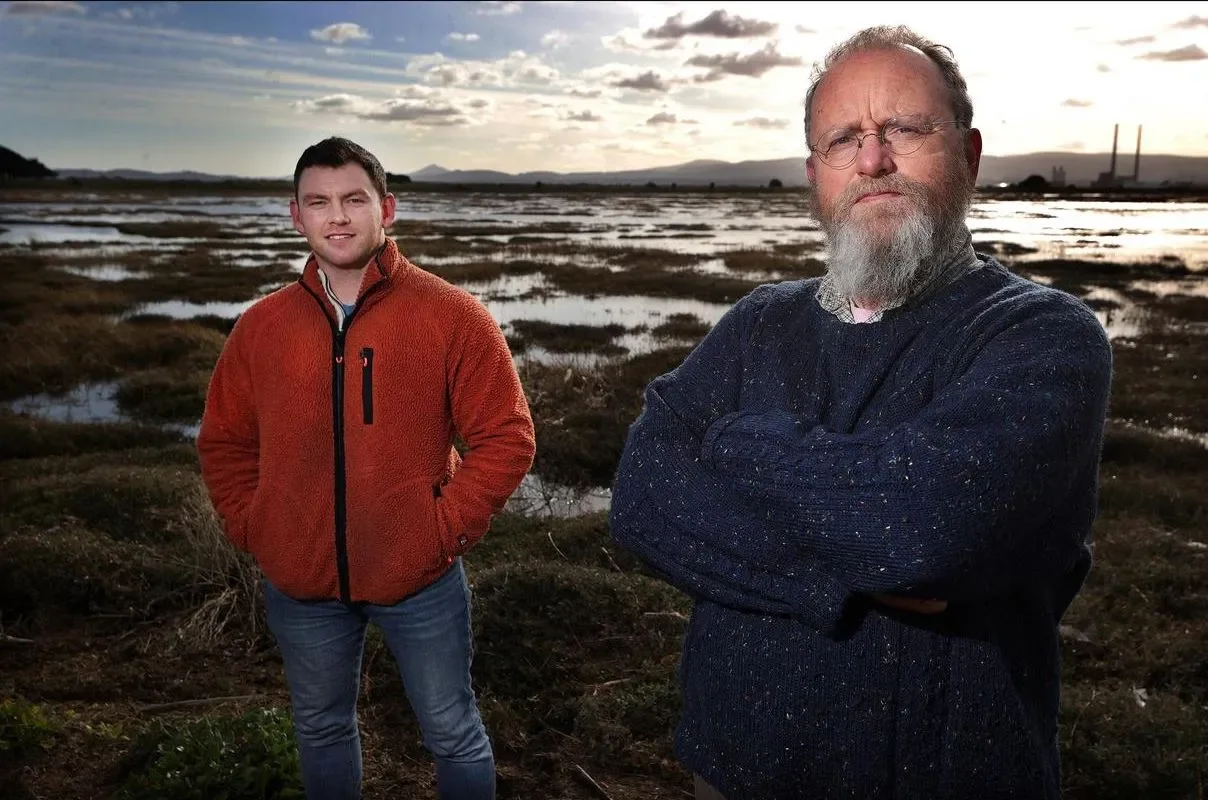
Dr Anthony Grey and Dr Brian Kelleher at the South Lagoon, Bull Island, Dublin. Photo: Steve Humphreys
Dublin's Bull Island is a natural ‘carbon sink’ that could be used as a model for projects to capture greenhouse gases, according to scientists.
Similar locations based on the structure of the island, which was formed by the dredging of Dublin port in the 19th century, could help Ireland meet its climate targets,
“Bull Island is capturing and storing carbon – greenhouse gases – from the atmosphere,” said Dr Anthony Grey, a researcher in organic geochemistry at the School of Chemical Sciences in Dublin City University (DCU).
“As well as that benefit, we can see that pollutants such as heavy metals and microplastics are being immobilised around the island, while promoting biodiversity, which is in decline in many places around Ireland.”
The use of coastal sediments as carbon sinks could help Ireland meet its net-zero carbon emissions target by 2050. More widely, it offers a natural solution for a global problem, where 40 billion metric tonnes of carbon enters the atmosphere each year.
“The use of offshore, artificially constructed islands similar to Bull Island would be a long-term solution to our greenhouse gas problems,” said Dr Brian Kelleher, also of the School of Chemical Sciences at DCU.
“This is a natural solution to the greenhouse gas problem and more workable than many of the engineering solutions that are out there, such as underground storage.
“The potential is there, we believe, for this approach to have a big impact.”
Engineers understand what led to the creation of Bull Island during the dredging of Dublin port, which had silting issues.
This knowledge means these processes could be replicated around the coast, to create new islands in areas threatened by coastal erosion and sea-level rises.
“Sediment, in theory, could be diverted to the areas of most need,” said Dr Kelleher. “Of course there may be impacts on ecosystems that we can’t envisage in advance, but that risk should be balanced against the likely benefits to biodiversity, which we have seen at Bull Island.”
The full story can be seen here: https://www.independent.ie/news/environment/bull-island-could-hold-the-solution-to-ireland-meeting-net-zero-climate-emissions-target-42357029.html
Samples made in School of Chemical Sciences lab aboard new lunar rover that has launched for the moon
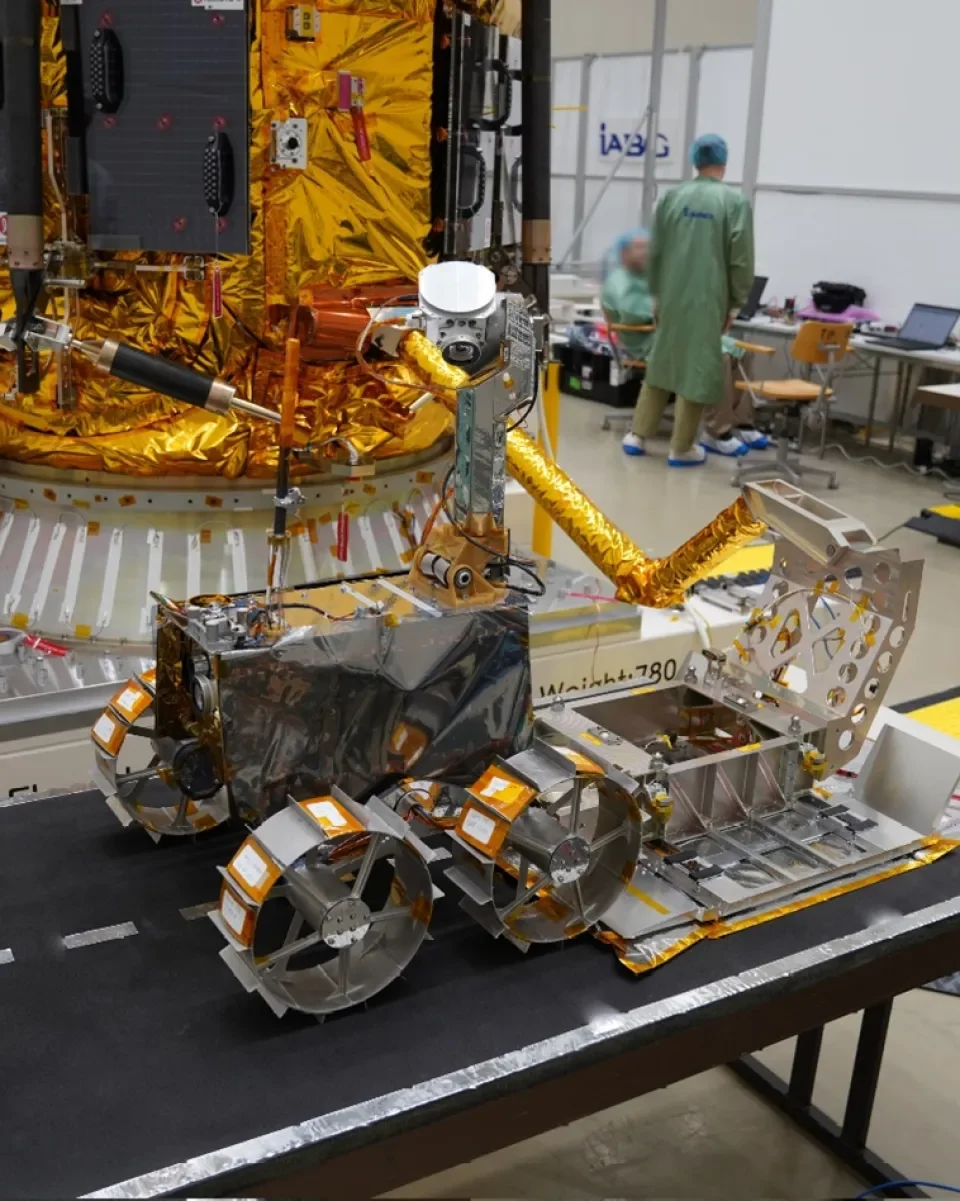
Image of the Rashid Rover being prepared for launch (Credit: MBRSC)
Polymer and metal samples developed in Dr Susan Kelleher’s lab at in the School of Chemical Sciences in DCU were launched for the moon aboard a new lunar rover to study the way moon dust sticks to different surfaces.
These samples were produced in the School of Chemical Sciences and prepared by Dr Kelleher, and three members of her team - Dr Graham Reid, Dr James McCormack, and Dr Jessica McFadden. They are affixed to the wheel of the Rashid Lunar Rover, designed and constructed by engineers and scientists at the Mohammed bin Rashid Space Centre (MBRSC) in the United Arab Emirates. The Rashid Rover will be brought to the moon aboard the HAKUTO-R Mission 1 lunar lander, produced by Japanese space exploration company iSpace as part of their first mission to the moon.
The project is part of a collaboration between Dr Kelleher, who works on producing nano- and micro patterned/structured surfaces at DCU, and Dr Aidan Cowley in the European Astronaut Centre in the European Space Agency (ESA), who have partnered with the MBRSC to develop samples of interest.
The aim of the mission is to study the adhesion of regolith (moon dust) onto different surfaces using a high resolution camera to gain an understanding on how it can be reduced. Moon dust is very sharp, dry and fine, and difficult to reproduce on Earth. It can interfere with electronics and how gaskets and seals work, and can be abrasive.
Eight sample surfaces, a combination of polymer and metal samples with micro- and nano-scale patterns on their surface as well as unpatterned control samples, were prepared for the lunar rover in the labs at DCU last year with the help of funding from both Science Foundation Ireland and the Irish Research Council. After testing to ensure they can withstand harsh launch conditions, the samples were launched to the moon aboard a SpaceX Falcon 9 rocket scheduled on December 11th from Cape Canaveral Space Force Station, Florida.
School of Chemical Science Researchers win major Challenge Funding from Science Foundation Ireland
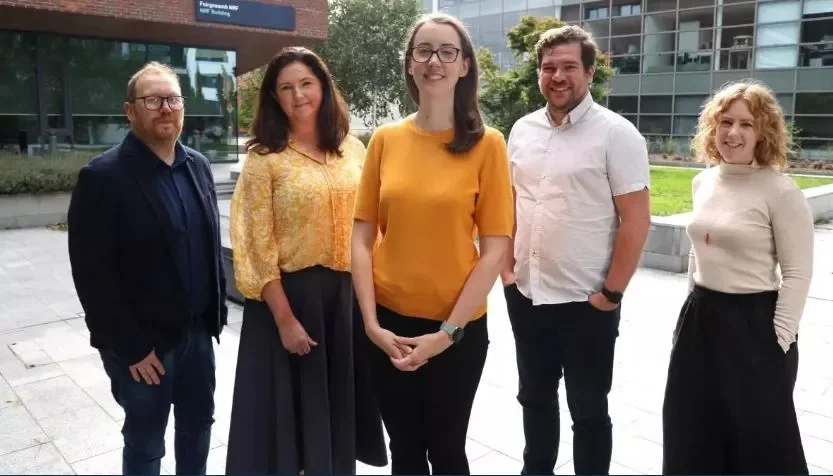
Dr. Brian Freeland, Samantha Fahy, Dr. Jennifer Gaughran, Dr. Keith Rochfort. and Dr. Susan Kelleher
The Grain-4-Lab team were awarded €2.4m in funding for their proposed solution to two different sustainability challenges.
The project, undertaken by Dr. Jennifer Gaughran (DCU Physical Sciences), Dr. Brian Freeland (DCU Biotechnology), Ms Samantha Fahy (DCU Sustainability), Dr. Susan Kelleher (DCU Chemical Sciences) and Dr. Keith Rochfort (DCU Nursing, Psychotherapy and Community Health), was selected as the front runner of the Challenge and is developing a solution to tackle sustainability challenges in plastic usage in Irish research laboratories by using waste produced from the brewing and distilling industry in Ireland. The research team has been working in partnership with organisations such as Waterford Distillery, Murphy & Son, Smallwares and Key Plastics to develop, test and trial the solution.
The award was announced today, October 5th, by the Minister for Further and Higher Education, Research, Innovation and Science, Simon Harris TD. Speaking about the prize, the minister said:
“I am delighted to announce Grain-4-Lab as the winner of this year’s Plastic Challenge as part of the SFI Future Innovator Prize. I want to congratulate the team - Dr. Jennifer Gaughran, Dr. Brian Freeland, Ms Samantha Fahy, Dr. Susan Kelleher and Dr. Keith Rochfort from Dublin City University - for their leadership.
The project is aimed at developing a solution to tackle plastic usage in Irish research laboratories by using waste produced from the brewing and distilling industry in Ireland. The Grain-4-Lab team will work towards reducing plastic waste within our labs and our colleges. This is the leadership we need to help us meet our climate targets – innovative solutions and dynamic leadership."
Find out more about the Grain-4-Lab project here.
DCU PI named SSPC Researcher of the Year
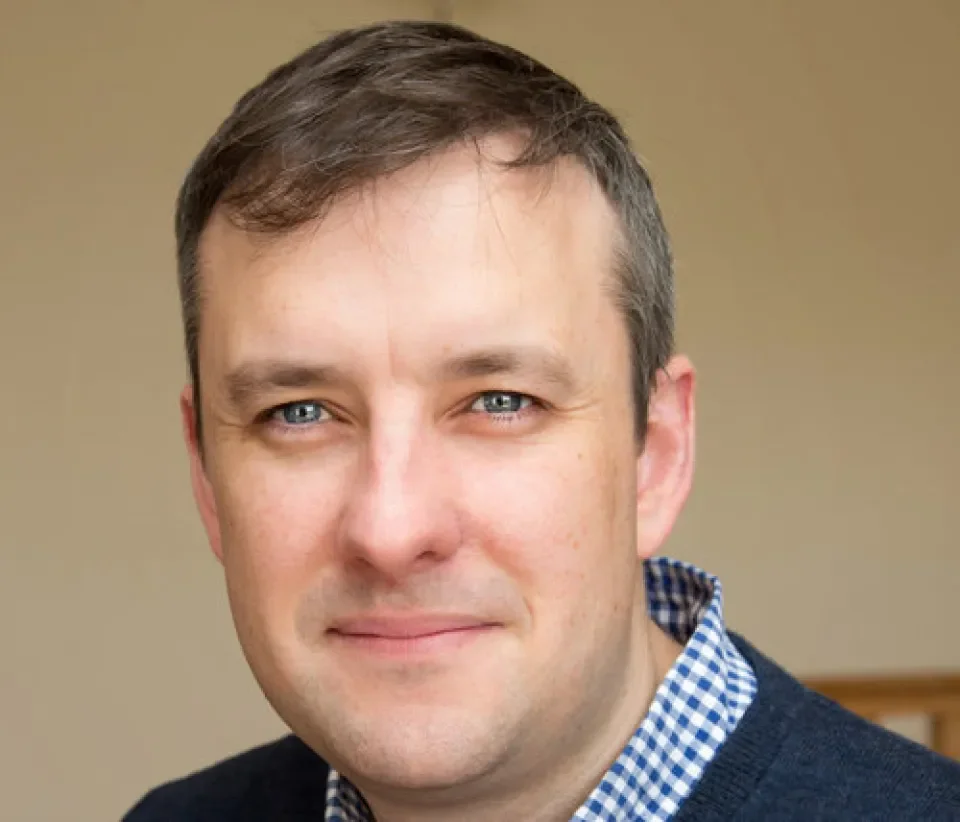
Dr Andrew Kellett
We are delighted to hear that Dr Andrew Kellett from DCU School of Chemical Sciences was named at the Solid State and Pharmaceutical Cluster (SSPC) Researcher of the Year for 2022. The SSPC is Science Foundation Ireland's Research Centre for Pharmaceuticals, where Dr Kellett is a Funded Investigator.
Dr Kellett is Associate Professor of Inorganic and Medicinal Chemistry and leads a diverse research group in the area of inorganic medicinal chemistry, with a focus on discovery of metallodrug-nucleic acid interactions for biochemical and therapeutic application. He completed his B.Sc. in chemistry from NUI Maynooth, received his PhD under the guidance of Prof. Michael Devereux and Dr. Maureen Walsh in 2007 from the Dublin Institute of Technology, and was then appointed as A.F. Graves Postdoctoral Fellow at the Focas Research Institute from 2008 - 2011. In 2011 he joined DCU as lecturer of Inorganic Chemistry, in 2014 moved to lecturer of Inorganic and Medicinal Chemistry and was appointed to Associate Professor in 2017.
You can read more about the work of Dr Kellett and his team here.
Dr Brian Kelleher secures €1 million in research funding as part of the Marine Institute's Blue Carbon Call
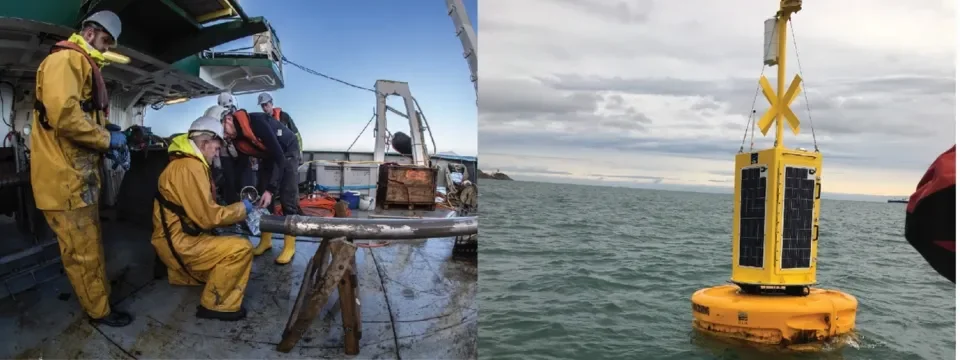
The Quest project will use data collected from geological cores (pictured left) and sensing buoys (pictured right) to investigate the potential for carbon storage in coastal and marine sediments.
Dr Brian Kelleher from the School of Chemical Sciences in DCU has secured €1 million in funding for the Quest project, in collaboration with Dr Mark Coughlan in University College Dublin. Dr Kelleher and Dr Coughlan will lead the Quest project, supported by Dr Mike Long at UCD, Dr Anthony Grey at DCU and Dr Markus Diesing at the Geological Survey of Norway (NGU). They will work closely with Dr Grace Cott from University College Dublin who is team lead of the Blue C project.
The Quest project team is an international collaboration and will conduct a multidisciplinary programme of research to qualify and quantify stocks of carbon in Irish marine sediments, examine and characterise threats to Blue Carbon in these settings and support the development of long-term management strategies. This will include supporting the designation of Marine Protected Areas and facilitate the delivery of the Government’s Climate Action Plan. The Quest project also intends to engage with stakeholders and the public to achieve a better understanding of Blue Carbon across society, and to raise the visibility of such research at a national and EU level.
Dr Kelleher's research interests include the molecular characterisation of natural organic matter and influence on carbon/nitrogen cycling; the growth mechanisms of marine gas hydrates and potential for growth off the west coast of Ireland; marine sediment organo-mineral characteristics as an indication of hydrocarbon presence; and the isolation and structural elucidation of novel compounds from natural organic matter. He is a funded investigator in the SFI Research Centre for Applied Geosciences.
